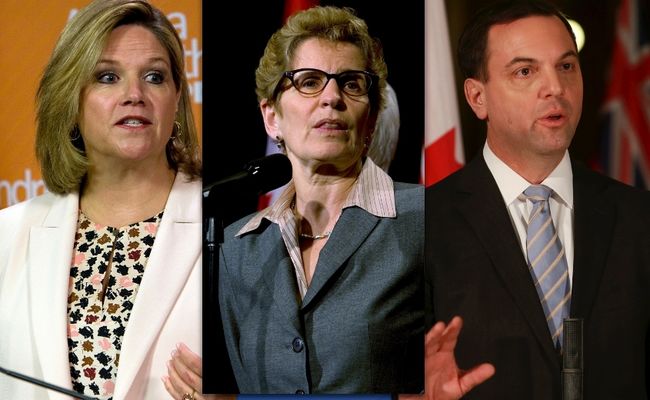It is impossible to say with certainty what the electoral outcome of Ontario’s election will be. However, the political outcome is far easier to discern: after the election there will be a shift right in the political terrain of the province.
Hudak and his Tories seem to have tacked hard to the right after their brief tactical back down on right-to-work during the by-elections earlier this year. The Tories have promised to create a million jobs but also cut 100,000 public service sector jobs. Hudak wants to balance the budget through aggressive budget cuts, 7.6 billion over the next four years. This means ending or reducing all sorts of modest programs and grants that help people squeak by.
The Liberals have been relatively silent with campaign announcements so far. They are campaigning on their budget, which they crafted to appeal to progressives with proposals such as a slight tax increases on the rich, and the formation of the Ontario Retirement Pension Plan. The budget was a Machiavellian maneuver by the Liberals to trap the ONDP into either supporting them or to force the defeat of a “progressive” budget. The tack left by the Liberals, who certainly are no progressives, was conditioned solely by the momentary requirements of parliamentary jockeying. By protecting their left flank now the Liberals give themselves a chance to live another day. Whatever is progressive in this budget, will not be on offer after this election.
The ONDP decided to not support the budget and trigger the election. They have subsequently campaigned on a bizarre populist platform. They want to trim the budget by 0.5 per cent, a cut of about 600 million. Horwath will also create a new minister of savings and accountability while cutting taxes on small business. This farcical strategy of trying to move right to eat into the Liberal base is doomed to fail. It demobilizes elements of their own base and tries to appeal to voters on terms already occupied by other parties. If fiscal conservatism and small business tax cuts are your issues, why would you jump ship from parties that have long supported those issues to a party steeped in union history and social democracy? You can’t out liberal the Liberals.
The ONDP strategy also leaves the door open for the rest of the parties to move further right. Hudak says we need to cut the budget by 2 per cent and cut 11 ministers, the NDP counters by proposing a 0.5 per cent budget reduction and cutting 8 ministers. It is absurd.
So what’s a lefty to do? Are we to abstain, hold our nose and vote NDP, or tactically vote Liberal? To think and debate elections on these terms is misleading because it separates a broader political understanding of the social forces in the province from a momentary political judgment. The first thing to note is that unions in the province have been on the defensive since the 2008 crisis, if not before. In the private sector Ontario has shed a massive amount of jobs in the manufacturing sector since 2003 and since the 2008 crisis the rate of factory closures in Ontario has only worsened. This has meant that private sector unions have been extremely weakened to the point where concessions are the new normal in order to stave off moving production.
In the public sector, unions have fared better, but that is only a relative statement. Since the crisis municipal and provincial public sector workers have been the target of the right’s ire. The result has been a very defensive posture from the unions and the left. The tenuous economic “recovery” since the recession and the employer offensive in the province has meant that the union movement has adopted a bunker mentality. The OFL has been doing very good work in its “Stop Hudak” town halls across the province, but the division in the labour movement between OPSEU and the OFL is not helping.
But this isn’t just a matter of figuring out where the union movement is; rather this is about understanding where trade union activists are. The latter are the key, as they are the most active element in the only mass organized part of the class. Union activists, those at the local level who do the heavy lifting, have by and large not broken with the NDP. This isn’t because they have been duped, rather this comes from a sober assessment of their own workplace conditions and the broader political terrain. What other realistic options are there for those steeped in the union movement? What is to the left of the NDP? It is easy for many lefties outside or on the periphery of the labour movement to say abstain or draw a crude equivalence that says Horwath and Hudak are the same. Those who would bear the brunt of the blowback are less likely to be so glib in their conclusions.
What we can say is at this point support for the NDP amongst the union activists is taking the form of a pure defensive posture. This is not about who is putting forward positions for advancement, rather about who is less likely to forcefully attack labour.
This of course doesn’t mean that union activists are objectively correct in their support for the NDP. Social democracy is structurally incapable of delivering meaningful change, we can’t have reasonable things such as well-funded social programs; rational, affordable transit; good, safe jobs for all; affordable housing and secure retirement for all in a capitalist economic system. It is impossible. The left, which is extremely weak, needs to figure out a way to make these arguments without alienating the key elements within the union movement. Initially, this requires two things: a sober analysis of the actual social forces at play in the province and an orientation that seeks to empower workers as a class to fight for their own interests. Only then can we move from talking about a socialist alternative to actually building one.




